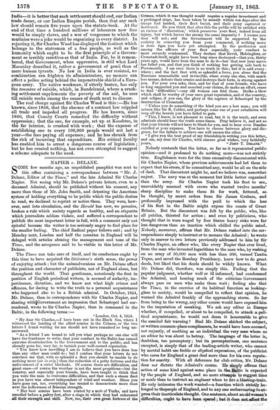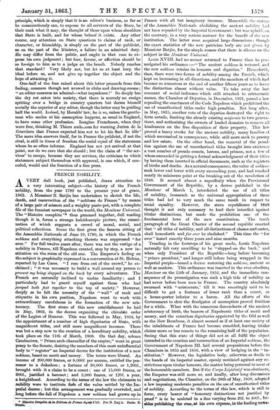NAPIER v. DELANE.
SOME few months ago, an unpublished pamphlet was sent to this office containing a correspondence between " Mr. J. Delane, Editor of the Times," and the late Admiral Sir Charles Napier. Not seeing why Mr. Delane's private letters, even to a deceased Admiral, should be published without his consent, any more than those of Mr. John Smith, and detesting the American system of holding everything to be public which the public desires to read, we declined to reprint or notice them. They were, how- ever, sent into circulation, and the Herald has now, we perceive, broken a rule which society regards as healthy, and an etiquette which journalists seldom violate, and suffered a correspondent to publish the most important letter in full, with a comment only not spiteful because the writer is too seriously angry to find place for the smaller feeling. The chief Radical paper follows suit ; and by Monday next, London and half the counties in England will be deluged with articles abusing the management and tone of the Times, and the arrogance said to be visible in this letter of Mr. Delane.
The Times can take care of itself, and its conductors ought by this time to have acquired the litte'rateur's sixth sense, the power of enjoying attack ; but the animadversions on Mr. Delane affect the position and character of publicists, not of England alone, but throughout the world. That gentleman, notoriously the first in position of English periodical writers, is accused of audacity, im- pertinence, dictation, and we know not what high crimes and offences, for daring to write the truth to a personal acquaintance who happened also to be a British admiral. In October, 1854, Mr. Delane, then in correspondence with Sir Charles Napier, and sharing withiGovernment an impression that Sebastopol had sur- rendered, wrote to Sir Charles Napier, then in command in the Baltic, in the following terms :—
"London, Oct. 4, 1854.
" My dear Sir Charles,—I have been out in the Black Sea, where I witnessed the landing of the allied armies in the Crimea, or the two letters I found waiting for me should not have remained so long un- answered.
"As a friend I am bound to tell you what perhaps no one else will have the frankness to write, that your conduct in the Baltic has caused extreme dissatisfaction to the Government and to the public, and has already gone far, very far, to tarnish your well-earned reputation.
" You know how unwilling I am to believe that you have done less than any other man could do ; but I confess that your letters do not convince me that, with so splendid a fleet you should be unable to do nothing more (sic in orig.) than the reduction of a petty fortress and the enforcement of a strict blockade. Of course there are difficulties, and great ones—of course the weather is not the most propitious—but the country, and especially your friends, have been taught to think that you were the man to overcome difficulties, and that such a steam fleet as you have was almost independent of wind and weather. Since you have gone out, too, everything has tended to demonstrate more than over the hollowness of Russian strength.
" Her best armies have been routed by a mob of Turks, and have recoiled before a paltry fort, after a siege in which they had exhausted all their strength and skill. Now, too, their own great fortress of the Crimea,-whieli it was thought would require a regular investment and a prolonged siege, has been taken by assault within ten days after the troops had landed, their fleet burnt, and their array captured or destroyed. Do you think that after this the public will be satisfied with an excess of ' discretion,' which preserves your fleet, indeed from all injury, but which leaves the enemy the same impunity ? I assure you_ they will not ; and the Government will be supported by the country in removing you from your command, if nothing more done titan you have yet attempted. In the profession and among the officers of your fleet especially, your conduct is most severely condemned. They declare that Revel, Helsingfors,,or Cronstadt itself, might have been long since destroyed—that you, thirty years ago, would have been the man to do it—but that now your nerve- has failed you, and that you think of nothing but getting safe back to, Portsmouth. I am sure there is no truth in this ; but it is said every. where ; and the fact that with so splendid a force, you alone find the- Russians unassailable and invincible, when every one else, with much less means, defeats their armies and destroys their forts, is strong against you. For your own sake, then, and for that of your friends, who have- so long supported you and asserted your claims, do make an effort, cease to find ' difficulties '—any old woman can find them. Strike a blow- which shall be worthy of your once great reputation, and of the country,. and eclipse, if you can, the glory of the capture of Sebastopol by the destruction of Cronstadt.
" Unless you do something of the kind you are a lost man ; you will- return like Sir R. Calder, and perhaps some one of your subalterns will reap all the laurels you have failed to gain. "This, I know, is not pleasant to read, but it is the truth, and even admirals should hear the truth some times. Pray believe it, and act so- that your friends will not have to blush for you, and to hear even Dinidas extolled at your expense. You have to choose between glory and dis- grace, for the failure to achieve one will ensure the other.
" I give you the best proof of my friendship in writing you this letter,. and am, my dear Sir Charles, with sincere good wishes, very faithfully
yours, " Jona T. DELANE."
Nobody contends that the letter, so far as it represented public. opinion—and it professed to do nothing more—was not strictly true. Englishmen were for the time excessively discontented with Sir Charles Napier, whose previous achievements had led them to expect that his errors, if he committed any, would be all on the side- of dash. That discontent might be, and we believe was, somewhat, unjust. The navy was at the moment but little better organized than the army. Sir Charles Napier took his fleet to sea,. unavoidably manned with crews who wanted twelve months' sharp discipline to make them fit for work, fettered, as- he thought, by secret orders from Sir James Graham, and_ profoundly impressed with the peril to which the loss, ofhis fleet in the Baltic might expose the coasts of Great. Britain. But the discontent was felt by the public, who, like all publics, thirsted for action ; and even by politicians, who- thought that in wars waged by free States heavy risks were far- less dangerous than an inaction which chilled the public mind- Nobody, moreover, affirms that Mr. Delane rushed into the cor- respondence simply to instruct or to menace the Admiral ; he wrote only in answer to two letters previously addressed to him by Sir- Charles Napier, an officer who, like every Napier that ever lived,. from the man who invented logarithms to the man who, by rushing on an army of 30,000 men with less than 600, turned Tantia. Topee, and saved the Bombay Presidency, knew how to do great deeds, but liked that his deeds should be widely known. What. Mr. Delane did, therefore, was simply this. Feeling that the- popular judgment, whether well or ill informed, had condemned the Admiral, and hearing much of the criticism Government always pass on men who make them wait ; feeling also that• the Times, in the exercise of its habitual function as looking- glass to society, would be compelled to reflect that opinion, lie warned the Admiral frankly of the approaching storm. So far from being in the wrong, any other course would have exposed him to the imputation of sneaking. We ask any editor in Europe whether, if ccmpelled, or about to be compelled, to attack a poli- tical acquaintance, he would not deem it honourable to give the assailed fair warning? Had Mr. Delane shirked the subject, or written common-place compliments, he would have been accused, not unjustly, of soothing as an individual the very man whom .as an editor he was about to betray. The language of the letter is,. doubtless, too peremptory ; but its peremptoriness, one sentence excepted, is simply that of the leading-article writer, who cannot by mental habit use feeble or slipshod expressions, of the publicist, who cares for England a great deal more than for his own reputa- tion for suavity. With all deference for club critics, Mr. Delane does not dictate the Admiral's course. He simply affirms that action of some kind against some place in .the Baltic is expected by the people of England, and no more attempts to suggest time or mode than to instruct an engineer when to fire a blastingArain. He only intimates the work wanted—a function which strictly be- longed to thepeople of England, and to any one endeavouring to ex- press their inarticulate thought. One sentence, about anoldwoman's difficulties, • ought to have been awed ; but it does not affect the principle, which is simply that it is an editor's business, so far as he conscientiously can, to express to all servants of the State, be their rank what it may, the thought of those upon whose shoulders that State is built, and for whose behoof it exists. Any other course, any attention on State questions to claims of rank, or character, or friendship, is simply on the part of the publicist, as on the part of the El inister, a failure in an admitted duty. He may differ from the -public, and ought in that case to ex- press his own judgment ; but fear, favour, or affection should be as foreign to him as to a judge on the bench. Nobody reaches that standard? Very likely not, but let us at least keep the ideal before us, and not give up together the object and the hope of attaining it.
One-half of the fuss raised about this letter proceeds from this feeling, common though not avowed in clubs and drawing-rooms ; " an editor censures an admiral—what impudence !" So deeply has the dry rot eaten into society, that there is scarcely an ensign spitting over a bridge in country quarters but deems himself socially the superior of any editor, though the latter may be guiding half the world. Indeed, by Heralds' law, he is so, unless the gentle- man who smiles at his assumption happens, as usual in England, to have some other profession. Tmegine Frenchmen, when they were free, thinking M. Thiers ands..taus for warning Jurien de In Graveiere that France expected him not to let his fleet lie idle! The mere idea answers itself, for in France the publicist, if not the rival, is still in times of freedom the social equal of the statesman whom he so often informs. England has not yet arrived at that point, nor do we care that she should ; but the claim of " the ser- vices' to escape, because they are services, the criticism to which statesmen subject themselves with approval, is one which, if con- ceded, would end the function of a free press.































 Previous page
Previous page